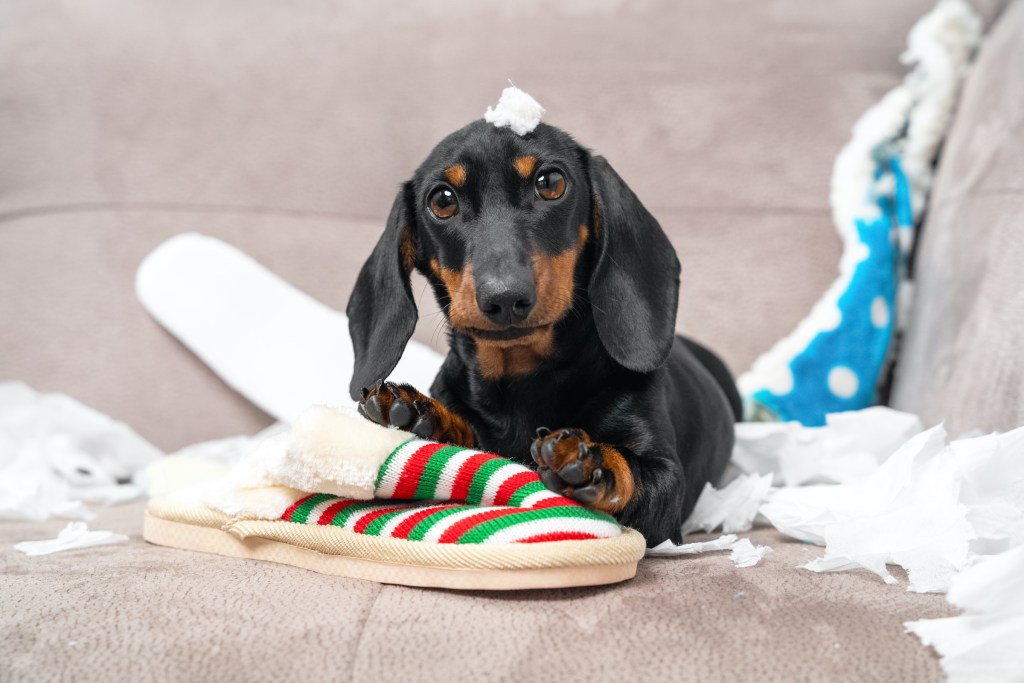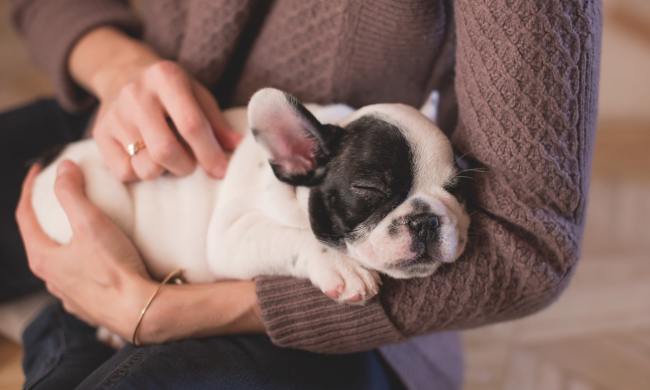Although puppies are known for their spectacular chewing abilities, any dog is capable of causing a lot of destruction with their teeth. Shoes and other household objects often have the most damage, much to the chagrin of pet parents. Still, as much as we love our fur babies, we don’t blame you for wanting to learn how to stop your dog from chewing on things.
As with any kind of training, learning not to chew will take your dog some time to understand. In the meantime, make sure to move your favorite pair of shoes to a height your best buddy can’t reach and get ready to learn. Here’s what you’ll need to know to help you learn how to stop a dog’s chewing.
At what age do dogs stop chewing on things?
If you have a teething puppy at home, you can expect the brunt of the chewing and discomfort to occur between 3 and 6 months of age, according to Ernie Ward, DVM. However, notes VCA Hospitals, the teething process technically begins when a pup is about 3 weeks old. At this age, deciduous – or baby – teeth start to come in, though this isn’t always as painful as when the permanent teeth erupt around 4 months old.
During that time, you may find a few fallen baby teeth around the house, or even in your puppy’s stool. Don’t worry! This is completely normal and harmless, according to VCA. There may be some bleeding on chew toys and gnawed-up objects, too, so don’t panic. All in all, you should expect teething symptoms to cease for good when your puppy is about 6 months old.
Why do dogs chew?
This relatable (and often frustrating) question can be answered in three words – just ask veterinarian Ernie Ward. Because it’s natural!
Mouths are to dogs what hands are to humans. That is, canines use their mouths to feel around and explore the world, especially when they’re young. Dr. Ward also notes that puppies chew more frequently around three to six months of age due to teething, which can cause some pain and discomfort. On a lighter note, some dogs may be prone to mouthiness during play, though this may manifest as chewing, licking, or even carrying objects in their mouth.
Certain breeds are also more likely to enjoy using their mouths in everyday life, according to the American Kennel Club. Labs, Goldens, and other retrievers were bred to carry prey with their mouths, so it’s no wonder they like to follow their instinct to pick up and chew objects.
Unfortunately, chewing can also be a sign of stress or attention-seeking in pets. Some pups engage in destructive behaviors when under severe stress, whether from separation anxiety, confinement to a small space, or exposure to another fear.
Ernie Ward remembers one patient, a Chihuahua who repeatedly gnawed on a table leg for attention. Why? To get him to stop, his owner would attempt to redirect his behavior and reward him with a treat, which only reinforced the chewing. The dog, of course, associated chewing with getting a treat! Luckily, there are more effective techniques to stop your dog from chewing on things.

How do I stop my dog from destroying everything?
To help your dog stop gnawing on everything in sight, it’s important to know why they’re engaging in this behavior in the first place. For teething, your solution can be as simple (yet time-consuming) as redirecting their chewing in the moment, then waiting for their teething phase to be over.
To help your puppy redirect biting and chewing, you may want to invest in puppy-friendly teething toys to give them when they need them. Whenever you notice your fur baby about to chew – or when you catch them in the act – try to capture their attention with the toy or chewy treat instead.
For adult dogs who enjoy chewing, you may also have more luck redirecting the behavior instead of discouraging it all together. In fact, notes Katelyn Schutz, CPDT, chewing is important for maintaining dental health and can provide an outlet for excess energy. The act of chewing itself isn’t a bad thing. It’s just important that your pup only gnaws on the right objects. To encourage this, invest in safe chew toys and treats, such as frozen raw marrow bones or DuraChew NylaBones, like Schutz recommends.
When your dog chews something they’re not supposed to, simply say “no” or “uh-oh” and replace the object with something they can chew on. In addition to making sure they have access to gnaw-friendly toys and treats, here are a few other ideas from the ASPCA:
- Make sure anything you don’t want in your dog’s mouth can be put where your pup can’t reach
- Help your dog maintain regular exercise and mental stimulation
- Buy trash bins that can close or even lock
- Keep your pup confined to a smaller area of your home while you’re away
- Invest in a chew deterrent spray to further discourage gnawing
If you’re still struggling with your furry friend’s destructive chewing habits, you can enlist the help of a professional dog trainer or veterinarian. Try your best to be patient as you work on your pup’s instinctual habit, though, as it’s normal for this to take some time. Practice makes perfect, even with dog training!




